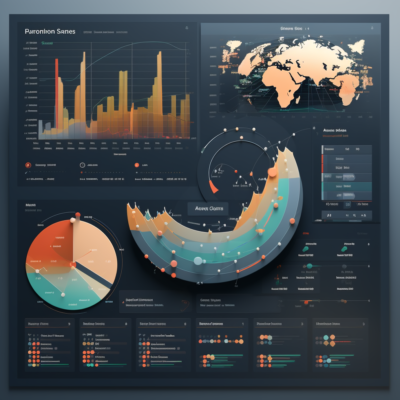
IIA’s Research and Advisory Network (RAN) clients leverage battle-tested frameworks and an exclusive network of over 150 active practitioners and unbiased experts to plan, prioritize, and execute strategic enterprise data and analytics initiatives. We regularly check the pulse of trending topics for the RAN community and facilitate critical conversations in virtual roundtable format for peer-to-peer exchange.
In a recent roundtable discussion with IIA RAN clients, data and analytics leaders from diverse industries gathered to discuss their various approaches to engaging with the business. The discussion covered a wide range of topics, from defining analytics for the organization to enhancing storytelling and engagement skills.
This discussion was moderated by Kathleen Maley, IIA Expert and VP of Analytics at Experian. Here are the key themes and takeaways:

Research and Advisory Network
Get access to the leading network of independent analytics expertise, allowing you to apply real practitioner insights against initiatives, projects, and problems.
Defining Analytics for the Organization
In the realm of data and analytics, defining the scope and integration of analytics within an organization is crucial for driving strategic decision-making. Leaders emphasize that a robust analytics strategy is often supported by direct endorsement from the top management, which facilitates smoother integration across departments. This top-down support enables analytics units to operate as autonomous entities, minimizing biases and enhancing their capacity to serve as central hubs that support various organizational functions. The approach to analytics is often empirical, aiming to eliminate guesswork by leveraging expanded data sources, thereby enhancing the precision of business decisions.
However, the perception of what constitutes analytics varies significantly across an organization, especially in large companies where the understanding of data can differ widely among employees. Leaders stress the necessity of translating complex data into actionable insights that are accessible to all business functions, advocating for a shift from technical jargon to a more inclusive business language. This transformation involves not only a deep engagement with data but also a proactive consultation that positions analytics as a dynamic tool for business strategy, not merely as a back-end technical task. By redefining analytics as an active, consultative process, organizations can foster a culture where data becomes a pivotal element in driving business actions and decisions.
Tailoring Your Approach to Meet Diverse Business Needs
Data and analytics leaders discussed adapting their strategies to suit diverse stakeholder needs. Attendees recognize that stakeholder engagement must be customized: some stakeholders may independently navigate tasks, while others require guidance due to their unfamiliarity with data science. Leaders spoke to the benefits of “riding the wave,” which involves aligning analytics initiatives with current business priorities that captivate executive attention. This ensures analytics efforts are pertinent and timely, fostering necessary support from various business units.
Also, attendees discussed the importance of avoiding to seem condescending, which can alienate stakeholders. Adopting an empathetic approach, where data teams step into the shoes of their stakeholders, helps in understanding their concerns and communicating in accessible, business-oriented language. This shift is not just about adjusting communication but also about blending technical skills with business acumen to demonstrate the concrete value of analytics. Such a balanced skill set advances the strategic application of analytics, making data teams vital partners in decision-making and enhancing collaboration across the organization.
Engaging Your Business Partners with a Consultative Approach
To foster deeper business engagement and ensure the efficacy of analytics initiatives, attendees highlighted the significance of adopting a consultative approach. In-person workshops emerged as a useful tool for cultivating this mindset among data and analytics teams. These sessions are structured to improve both the understanding and application of data by helping business partners articulate their challenges, confirm data availability, and evaluate the feasibility and value of solutions. This collaborative process includes scoring projects on their difficulty and potential value, thereby guiding more informed decisions on pursuing specific initiatives. Although adapting these workshops for virtual settings posed challenges, with physical sessions proving more effective, leaders are exploring digital tools to enhance remote engagement.
Moreover, leaders are using their expertise strategically by aligning projects with the organization's core business objectives, such as cost reduction or revenue enhancement. Projects that directly contribute to these goals are more likely to garner support and resources, enhancing their chances of success and impact. A standout example discussed was a GenAI initiative, which initially met with skepticism but eventually secured buy-in after demonstrating potential revenue benefits. This success story underscores the importance of aligning analytical projects with strategic business outcomes and using early insights to refine and accelerate project execution. This strategic alignment not only fosters organizational support but also positions the analytics team as a critical player in driving business efficiency and growth.
Developing Roles and Skills for Analytics Engagement
Data and analytics leaders highlighted the evolution and impact of specialized roles such as the data catalyst, which merges business acumen with technical expertise, akin to a product manager but with a focus on analytics. This role is pivotal in acting as the conduit between business stakeholders and analytical teams, ensuring data is translated into strategic decisions. However, securing a seat at the decision-making table remains a challenge, raising questions about the need for formal training to boost the consultancy capabilities of these roles and leverage business successes to build momentum and influence.
Some peers have formalized the data product manager role, transforming it from a basic project lead to a key strategic player akin to the CEO of a data product, complete with profit and loss responsibilities. This role strategically manages data products as business assets, aligning them with the company's go-to-market strategies, particularly noted in sectors like health insurance. Despite these advancements, challenges persist, such as meeting immediate business demands that may compromise optimal solutions—referred to as the “tyranny of the present.” Recognizing these hurdles, leaders underscore the importance of enhancing storytelling and facilitation skills within data teams to effectively translate complex data insights into actionable strategies. Additionally, adopting a hub-and-spoke model to structure analytics teams facilitates a comprehensive community of practice, enhancing collaboration and integration across various organizational levels.

Operationalizing Data Storytelling - Webinar
With the proliferation and sophistication of self-service tools, it is likely your organization uses visually stunning dashboards to track and consume data on a variety of business functions. But to realize the full value of this data, analytics practitioners need to think like product managers and reimagine these dashboards as customer-centric, Analytic Stories.
Enhancing Storytelling and Engagement Skills
In exploring effective strategies to boost stakeholder engagement, data and analytics leaders emphasize the importance of hands-on, practical methods like role-playing exercises. These sessions simulate real-world scenarios where analytics team members adopt the role of business users to critically assess the utility and user-friendliness of analytics tools they create. This practice not only refines their ability to present data but also enhances their understanding of the user experience, ensuring the tools are intuitive and address the actual needs of end-users. Such initiatives are particularly crucial when introducing new technologies or systems, helping to smooth their integration and acceptance across the organization.
Further emphasizing practical engagement, leaders also discuss the value of structured interactions like “lunch and learns” and informal monthly meetings that foster a culture of open communication and continuous learning within analytics teams. These gatherings provide a platform for team members to share insights and refine their approach to presenting complex data in business-relevant terms. By encouraging a mix of brainstorming and operational demonstrations, these sessions not only enhance the analytical skills of the team but also ensure that analytics solutions are closely aligned with real business needs and are actionable. This dual approach helps in building a bridge between the technical and business sides of analytics, fostering a deeper understanding and collaboration across the organization, and highlighting the tangible benefits of analytics initiatives.